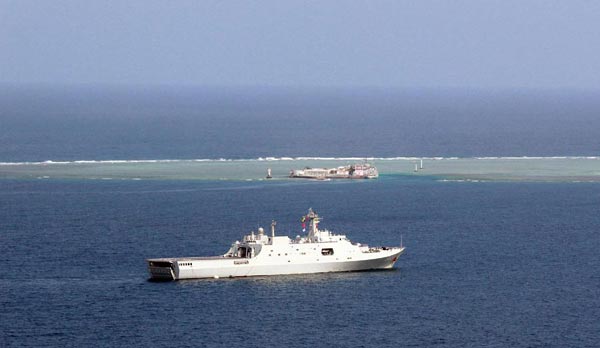 |
|
A formation of the Nanhai Fleet of China's Navy on Saturday finished a three-day patrol of the Nansha islands in the South China Sea. [Photo/Xinhua] |
Some nations, with the US taking the lead, heavily criticized China for constructing infrastructures on some reefs and islands in the South China Sea recently. On Monday, Singaporean Defense Minister Ng Eng Hen said Singapore wants India to play a bigger role in the South China Sea. On March 4, the Secretary General of the Association of Southeast Asian Nations Le Luong Minh told the Manila Times that China's territorial claims in South China Sea based on its "nine-dash" line were "not binding".
However, such remarks only show why it is important for certain Southeast Asian countries to strictly abide by the Declaration on the Conduct of Parties in the South China Sea. And, as agreed in the Declaration, which was signed between China and ASEAN in 2002, the disputes in the South China Sea should be resolved by the "sovereign states directly concerned". Thus, in order to avoid further complicating the already complex situation, no outsides forces should be involved in the maritime disputes.
The crux of the disputes in the South China Sea is who has sovereignty over various reefs and islands. The different theories on the "nine-dash" line agree that China has sovereignty over all reefs and islands within the line, but differ in the legitimate status of the waters within the dotted line. Because of the international legal principle that the "land dominates the sea," the legal status of the waters within the "nine-dash" line will be clarified only after the sovereignty of the reefs and islands in the South China Sea is determined.
On May 7, 2009, China submitted two notifications to the UN general secretary, stating that "China has indisputable sovereignty over the islands in the South China Sea and adjacent waters", and it "enjoys sovereign rights and jurisdiction over relevant waters, as well as the seabed and subsoil therefore". The notifications are in line with United Nations Convention on the Law of the Sea and Chinese laws. China can therefore legitimately build up the infrastructure on its own islands and reefs in the South China Sea.
China resolutely safeguards and guarantees the freedom of navigation in South China Sea. However, as a non-member of UNCLOS, the United States doesn't admit that all military observation activities within an exclusive economic zone must obtain the approval of the coastal state concerned. The frequent US military activities in China's exclusive economic zone clearly challenge and harm the freedom of navigation in the South China Sea.

I’ve lived in China for quite a considerable time including my graduate school years, travelled and worked in a few cities and still choose my destination taking into consideration the density of smog or PM2.5 particulate matter in the region.